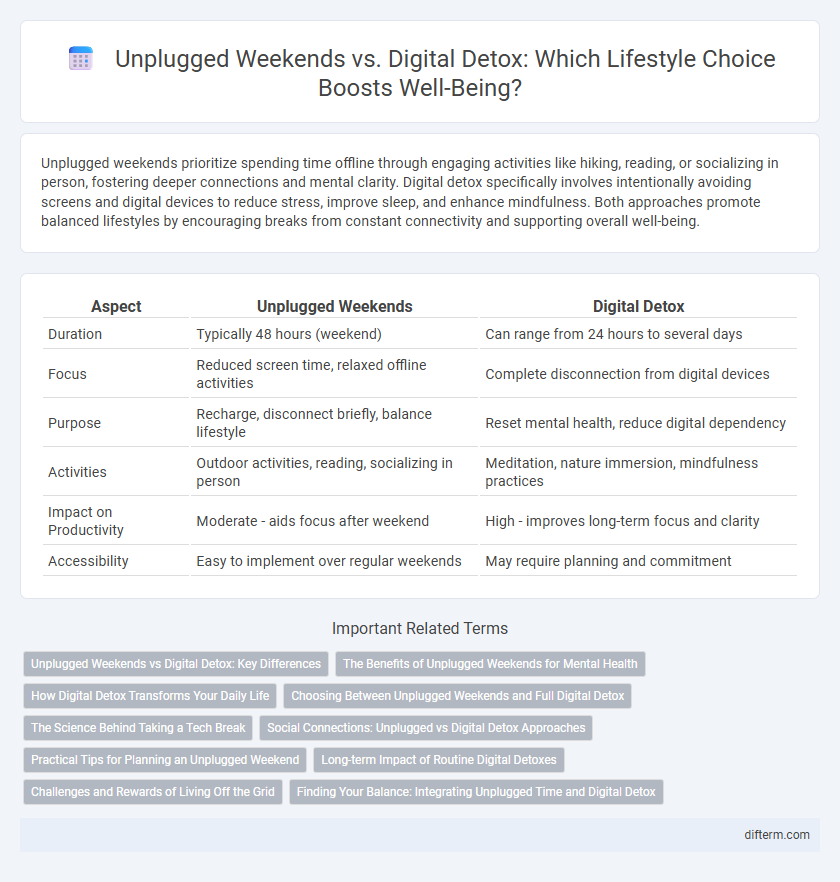Unplugged weekends prioritize spending time offline through engaging activities like hiking, reading, or socializing in person, fostering deeper connections and mental clarity. Digital detox specifically involves intentionally avoiding screens and digital devices to reduce stress, improve sleep, and enhance mindfulness. Both approaches promote balanced lifestyles by encouraging breaks from constant connectivity and supporting overall well-being.
Table of Comparison
| Aspect | Unplugged Weekends | Digital Detox |
|---|---|---|
| Duration | Typically 48 hours (weekend) | Can range from 24 hours to several days |
| Focus | Reduced screen time, relaxed offline activities | Complete disconnection from digital devices |
| Purpose | Recharge, disconnect briefly, balance lifestyle | Reset mental health, reduce digital dependency |
| Activities | Outdoor activities, reading, socializing in person | Meditation, nature immersion, mindfulness practices |
| Impact on Productivity | Moderate - aids focus after weekend | High - improves long-term focus and clarity |
| Accessibility | Easy to implement over regular weekends | May require planning and commitment |
Unplugged Weekends vs Digital Detox: Key Differences
Unplugged weekends involve intentionally setting aside specific days to minimize digital device usage, promoting relaxation and presence without completely severing connectivity. Digital detox extends beyond weekends, often requiring longer periods away from all electronic devices to reduce screen time and improve mental health more profoundly. The key difference lies in duration and intensity, with unplugged weekends serving as manageable breaks and digital detoxes functioning as more comprehensive interventions.
The Benefits of Unplugged Weekends for Mental Health
Unplugged weekends, characterized by intentional disconnection from digital devices, significantly reduce stress and promote mental clarity by allowing the brain to rest from constant digital stimulation. This periodic break enhances mindfulness, improves sleep quality, and fosters stronger personal connections, contributing to overall mental well-being. Unlike extended digital detoxes, unplugged weekends are manageable, encouraging sustainable habits that support long-term emotional resilience and cognitive health.
How Digital Detox Transforms Your Daily Life
Digital detox transforms your daily life by significantly reducing screen time, which enhances mental clarity and promotes deeper interpersonal connections. Unplugged weekends help reset your brain, lower stress levels, and improve sleep quality by eliminating constant digital distractions. This intentional disconnection fosters mindfulness, encourages outdoor activities, and boosts overall well-being through a healthier balance between technology and real-world experiences.
Choosing Between Unplugged Weekends and Full Digital Detox
Choosing between unplugged weekends and a full digital detox depends on the desired impact on mental clarity and stress reduction; unplugged weekends offer a balanced approach by limiting screen time temporarily, while a full digital detox involves complete disconnection for an extended period, promoting deeper mindfulness and reset. Research from behavioral health studies shows that periodic unplugged weekends correlate with reduced anxiety and improved sleep patterns, whereas full digital detox retreats yield significant improvements in focus, creativity, and emotional resilience. Lifestyle experts recommend assessing personal technology habits and mental health goals to select the approach that best supports sustainable well-being and digital balance.
The Science Behind Taking a Tech Break
Unplugged weekends provide a structured opportunity for the brain to reset by reducing exposure to blue light and continuous digital stimuli, which are linked to disrupted circadian rhythms and cognitive overload. Digital detox initiatives have been scientifically shown to lower cortisol levels and enhance mindfulness by promoting periods of intentional disconnection from smartphones, social media, and constant notifications. Neuroscientific studies reveal that regular tech breaks improve attention span, reduce anxiety, and foster deeper social connections through face-to-face interactions.
Social Connections: Unplugged vs Digital Detox Approaches
Unplugged weekends prioritize intentional face-to-face interactions by setting boundaries on device usage during social activities, enhancing genuine connections and reducing digital distractions. Digital detox approaches often involve a complete or partial disconnection from all digital devices for a specified period, aiming to reset mental well-being but can temporarily limit communication with social networks. Both methods improve social bonds, but unplugged weekends balance technology use with social presence, whereas digital detox emphasizes full disconnection for deeper cognitive and emotional restoration.
Practical Tips for Planning an Unplugged Weekend
Planning an unplugged weekend involves setting clear boundaries by turning off non-essential devices and notifying friends or family of your digital break to minimize interruptions. Choose engaging offline activities such as hiking, reading physical books, or practicing mindfulness exercises to enhance relaxation and presence. Preparing essentials like printed maps, journal, and offline entertainment ensures a smooth transition from digital dependency to meaningful disconnection.
Long-term Impact of Routine Digital Detoxes
Routine digital detoxes significantly reduce stress levels by limiting screen time and encouraging mindfulness, promoting overall mental health. Regular unplugged weekends contribute to improved sleep patterns and increased productivity, supporting sustainable well-being. Consistent disconnection from digital devices fosters deeper social connections and enhances emotional resilience over time.
Challenges and Rewards of Living Off the Grid
Living off the grid presents challenges such as limited access to technology, reliance on renewable energy sources, and the need for self-sufficiency in food and water management. The rewards include enhanced mental clarity, reduced stress from constant connectivity, and a deeper connection with nature that supports overall well-being. Unplugged weekends serve as a manageable introduction to digital detox, while fully off-grid living demands comprehensive planning and adjustment to a technology-free lifestyle.
Finding Your Balance: Integrating Unplugged Time and Digital Detox
Unplugged weekends offer a structured approach to disconnecting from screens by minimizing digital interaction during specific days, fostering deep relaxation and mindfulness. Digital detox focuses more broadly on reducing overall screen time and technology dependence in daily life to improve mental clarity and well-being. Finding your balance involves combining scheduled unplugged weekends with ongoing digital detox practices to cultivate sustained mindfulness and enhanced productivity.
unplugged weekends vs digital detox Infographic

 difterm.com
difterm.com